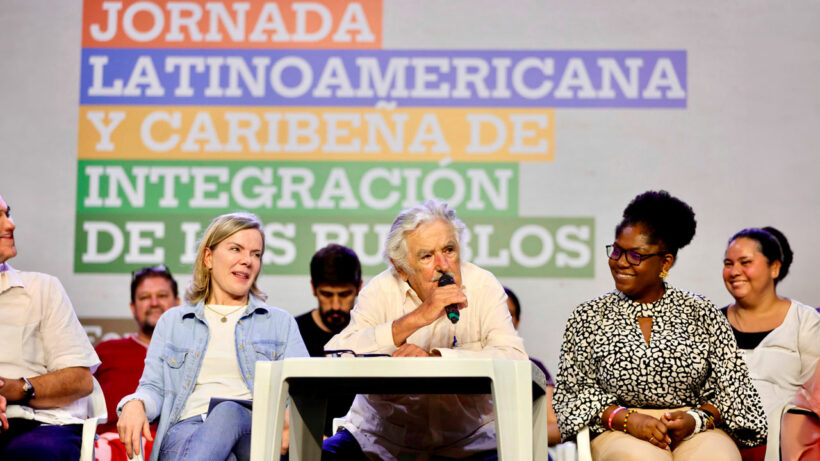Speaking at the closing ceremony of the Day of Integration of the Peoples of Latin America and the Caribbean in Foz do Iguaçu (Brazil), the Vice-President and Minister of Equality and Equity, Francia Márquez Mina, insisted on the need to seek the unity of the continent through the initiative of its peoples and not to leave it to the influence of governments that are necessarily temporary.
“To leave the unity of Latin America and the Caribbean in the hands of the governments in power is to condemn ourselves to the fact that each time someone new arrives, they will dismantle our processes and improvise new ones. While governments come and go with attempts at integration, Latin America and the Caribbean move along paths and lasting connections that have been established by the people themselves. These links have given rise to wonderful and little-known cultural exchanges, such as the routes of ethnic and cultural diversity, such as the routes of our knowledge and gastronomic flavors, literature, cinema, television, and music, which are true forms of social integration and Latin American integration,” she said. For the High Representative, we as a region must strengthen political and economic mechanisms and social exchanges between black, indigenous, and peasant peoples, women, people with disabilities, the LGBTIQ population, and, in general, the popular sectors. “A true and lasting integration of our region must be a people’s issue and not just an initiative of governments. Governments are called upon to create mechanisms that allow these social exchanges to connect more easily, but bureaucracy prevents this. They should allow music, feelings, and ways of life to flow,” he added.
In this sense, she stressed the need to consolidate a strong mechanism for Latin American and Caribbean integration, not only as a matter of interdependent identities but also as a matter of overcoming the gaps of inequality and injustice. “Only if the peoples themselves legitimize the mechanisms of regional integration will we make them sustainable. But many people don’t even know that they exist, what they do, and what they produce. That is why we have an important task to socialize what they are, what their purpose is, and to rethink the strategies so that they have an impact on people’s lives,” he stressed.
The Vice-President reiterated that it is a question of looking inwards, looking at ourselves, looking at ourselves as peers, as equals, and even looking at Africa, at its integration process, which would allow us to consolidate a Global South that takes decisions in areas where we believe that only the powers of the North play: “Global challenges must include our participation in decision-making. We must strengthen and articulate the existing mechanisms, protect them from sectarianism, and ensure that they take into account the diversity of thought in our region.
She added: “We will propose that Latin American and Caribbean progressivism be nourished by the traditional knowledge and thought of the anti-patriarchal, anti-racist, anti-colonial, and anti-capitalist popular sectors. We must be defenders of life to take up the struggles of all these interests. All these stakes should be common if we want to achieve that, despite our differences, we can build together. As a black woman, I say this: if Latin America does not have a real agenda in the face of structural racism, we cannot continue to talk about regional integration. If Latin America and the Caribbean do not take up a real struggle to eradicate the patriarchy that violates women and kills us every day, we cannot continue to talk about regional integration. It has to be part of a truly transformative agenda, an agenda that recognizes diversity, an agenda that recognizes our histories.
At the end of her speech, Márquez Mina put on the table two of the issues that, in her view, should be flagships on the road to the unity of the peoples of Latin America and the Caribbean: historical reparation, in the face of a true transformation that heals the effects of slavery, colonialism and racism, and the fight against hunger. “And these historical injustices must allow us to allow the people of Latin America and the Caribbean to identify with what we are doing. If not, we will continue to put the cart before the horse and people will continue to opt for a policy of death that will continue to kill millions of people in Colombia, Latin America, and the Caribbean. We will stand firm, with our hearts in our hands,” she concluded.






